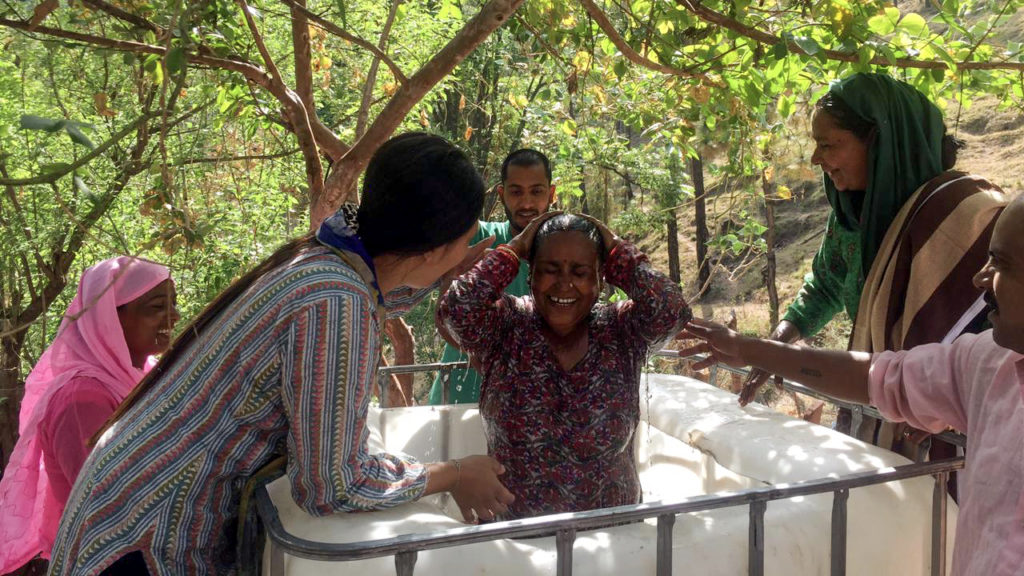Every weekend, Sandeep and his wife, Lalita, leave their home in a major city near the Himalayan mountains of South Asia with their family in tow. They travel hours, switching buses along rough terrain, to spend the weekend in a slum area deep inside the mountains.
There, they’ve become accustomed to seeing the results of a very lost society in this poor area – alcoholism is rampant and the domestic abuse that so often follows the addiction is prevalent. Hygiene is lacking. It doesn’t take an outsider more than a minute to see the needs of the area.

A year ago, there were no known believers among this people group in the Himalayas of South Asia. A couple weeks ago, four more were baptized, bringing the number of believers to nearly 70. IMB Photo
Still, Sandeep and Lalita are there because these people need so much more than physical restoration. They need the gospel. Less than a year ago, there were no known believers in their midst.
Recently, four believers were baptized from among this people group, bringing the total number of believers to nearly 50. Twenty-five have obediently followed with believer’s baptism.
IMB missionary Mike McKenzie said this extraordinary response to the gospel is encouraging and not typical of the area where they serve.
Believers in other areas are getting excited, realizing that “God can move here,” Mike said.
National leaders have risen among this people group, including Rakesh. Rakesh heard the gospel through one of the female leaders in the village, commonly called an “auntie.” The Lord radically changed his life, redeeming him from the unhealthy habits that bound him before. Now, his countrymen see his transformation and want what he has.
Rakesh has been spearheading the outreach to other villages.
Sandeep felt called to this people group in South Asia, since he first heard about them. After an initial visit with these people by Sandeep and Mike, Sandeep’s heart for them grew. He and Lalita are national partners of Mike and his wife, Beth, who serve in South Asia. The IMB missionaries equip existing churches and engage people groups in their area with the gospel.
They’d located this group on a trip that Mike commissioned among his national partners. The national partners were tasked to go into hard-to-reach areas and gather research on some of the remote peoples with no gospel access. During that time the team of nationals located and built relationship with 13 of these groups. This was one of the groups.
The people Sandeep and Lalita serve are Hindu, with a population of around 6,000. Because other people groups speak the language they commonly use, there’s a translation of the Bible and some audio recordings available to them. Still, it took perseverance for Sandeep and his wife to reach them with the gospel.
When Sandeep started visiting, he would go alone. A group of nearly 30 would gather, but the overwhelming feeling was that they were there for what they could physically receive from the strangers sharing the Bread of Life with them.
Slowly, the numbers of those attending started to dwindle. There were only five members of the burgeoning Bible study left. This was about 10 months ago.
Things started to change, though, when Beth encouraged Lalita to go into the village with her husband. It wouldn’t be easy for her to leave her home each week and bring her family along on the mission. But it ended up being key in these people knowing the gospel.
The first to commit to the Lord were women. And because of cultural gender barriers, Lalita was able to reach them in a way her husband simply wasn’t.
The group of five remaining from the Bible study was the first group to be. After they grasped the beauty of God’s mercy and grace, they burned with the knowledge. They wanted to go to the other villages where their family and friends lived and share with them.
Now, Sandeep and Lalita spend every weekend living among these people, traveling with them to equip the fledgling churches in the mountainous region.
Churches are multiplying because of missionary presence and partnership with national believers to reach the nations together. You can be a part of seeing more people transformed with the gospel and more churches planted – even in the high Himalayan mountains. Support the efforts in South Asia to make the gospel accessible to the least reached.
Some names may have been changed for security reasons.

